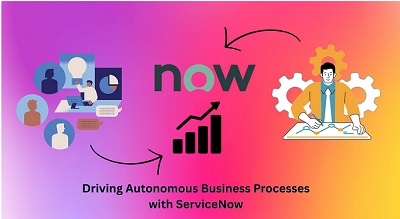
ServiceNow Hyperautomation is transforming how companies automate, plan, and manage workflows throughout the business landscape. By using cutting-edge AI, low-code platforms, and integrated automation, businesses can achieve digital process shifts and promote autonomous operations in 2025 and beyond.
ServiceNow Hyperautomation - Overview
ServiceNow Hyperautomation summarizes the integration of advanced automation technologies, such as AI, ML, RPA, and enhanced workflow management, into a unified platform. This approach drives the businesses' shift toward fully autonomous workflows and business functions. It enables firms to evolve from isolated, siloed automation to comprehensive, enterprise-wide process automation.

Key Technologies That Power Hyperautomation
Some key technologies at the core of ServiceNow Hyperautomation blend seamlessly with various tools. These include the following:
1) AI-Driven Automation:
For incident classification, predictive analytics, content creation, and cognitive decision support, ServiceNow's Now Platform connects gen-AI and ML. It enables both IT and business teams.
2) Robotic Process Automation (RPA)
RPA frees up crucial human resources for innovative thinking by automating repetitive, rule-based manual processes across systems. These include data entry, report development, and interaction with legacy apps.
3) Low-Code/No-Code Tools:
ServiceNow's Flow Designer (SFD) and Integration Hub simplify automation for executives. It enables users to quickly build intricate, automated processes without needing extensive coding skills.
Benefits of ServiceNow Hyperautomation
The following are the various benefits of using ServiceNow hyperautomation.
1) ServiceNow for Accelerated Digital Transformation:
By smoothly integrating process automation across departments—from IT and HR to customer care and finance—hyperautomation supports businesses' digital transformation efforts. This integration enables a consistent, effective, and proactive corporate environment.
Get hands-on learning experience on process automation with ServiceNow Training at Onlineitguru.
2) Improved Autonomous Workflows
Businesses can use ServiceNow to implement autonomous intelligent agents and connected workflows that react to events and triggers in real time with little assistance from humans. In addition to meeting company needs, this results in quicker reaction times, scalability, and growth.
3) Enhancing Business Procedures
ServiceNow provides verifiable business process improvement and operational excellence. It reduces manual workload, minimizes errors, and improves overall data quality by automating both simple and complex workflows.
4) Agility and Workflow Optimization
ServiceNow's hyperautomation enables continuous workflow optimization. It uses data-driven insights, predictive analytics, and real-time monitoring to improve operations. Furthermore, it quickly adjusts to shifting business needs.
Use Cases: How Are Enterprises Utilizing ServiceNow Hyperautomation?
Many top companies across industries use ServiceNow Hyperautomation for the following purposes:
1) IT Incident Management:
This reduces downtime and improves service quality by proactively routing, organizing, and solving IT incidents.
2) HR Service Delivery:
It helps to simplify case management, employee onboarding, and automated HR information access.
3) Customer service management:
It helps to improve customer happiness, automates case responses, and integrates omnichannel customer interactions.
4) Compliance and Risk Management:
It monitors compliance workflows in a regulated setting and enforces automated controls.
Techniques for Effective Hyperautomation
To optimize outcomes, businesses are recommended to:
- To maximize return on investment, start with high-impact, repetitive operations and then spread automation efforts throughout functions.
- For complete automation coverage, combine AI, RPA, and process automation (sometimes referred to as a "hyperautomation strategy").
- Give integration and data management top priority so that automation efforts are not isolated. But rather provide an end-to-end advantage for the entire company.
Understand IT Incident Management skills with the online ServiceNow Course with expert support.
The Future: Autonomous, AI-Powered Businesses
With a strong emphasis on AI-driven automation, ServiceNow's hyperautomation abilities are developing in 2025, making digital transformation even more accessible. This radically alters how companies operate while also simplifying operations:
More strategic human labor:
Employees can concentrate on higher-value, strategic tasks while routine, repetitive human labor is increasingly automated.
Real-time business agility:
Businesses can react quickly to prospects, hazards, or business changes thanks to autonomous workflows.
Competitive advantage:
Businesses that implement hyperautomation are in a strong position to surpass rivals thanks to productivity, flexibility, and creative employee and customer experiences.
What Is the Use of Hyperautomation?
By utilizing technologies like AI, Machine Learning, and RPA, hyperautomation broadens the scope of automation beyond simple repetitive operations to intricate, end-to-end processes. In actuality, ServiceNow Hyperautomation is utilized for customer service optimization, HR onboarding, financial process automation, and IT operations (incident resolution, change management).
- Hyperautomation reduces disruptions in IT by accelerating issue detection, automated ticket triaging, and root-cause analysis.
- It automates employee self-service, onboarding, and leave or compensation approval processes for HR.
- ServiceNow streamlines compliance checks, expense approvals, and invoice management in the finance department.
Is ServiceNow a Workflow Automation Tool?
Indeed, ServiceNow is an excellent solution for coordinating, automating, and optimizing digital business operations. It is essentially a workflow automation platform. The platform uses low-code, intelligent solutions to map, create, and automate tasks that have historically required a lot of human labor. Its features include both advanced AI-driven automation for complex, policy-driven scenarios and basic process automation (such as routing approvals).
For businesses implementing enterprise automation and hyperautomation plans, ServiceNow's workflow automation features are essential. The platform's scalability facilitates the transition to end-to-end autonomous workflows by enabling enterprises to begin with a single use case and grow into larger business process optimization efforts.
Deep dive into the ServiceNow workflow automation tool with a real-time ServiceNow Developer Course with industry experts.
ServiceNow Process Automation Designer
With the help of ServiceNow Process Automation Designer, businesses can develop, design, and oversee intricate, multi-step processes without requiring a high level of technical skill. Its drag-and-drop interface makes it simple to map business processes, assign tasks, integrate with other systems, and automate decision points.
Teams can swiftly build and refine process flows with Process Automation Designer, enabling real-time business process innovations. Additionally, it easily interacts with ServiceNow's larger automation suite, which includes AI, RPA, and ML components. This makes it simple to integrate automated processes and workflow optimization into each step of a process.
Businesses may reduce reliance on specialized development, increase accuracy, accelerate the path toward digitization and enterprise automation, and empower both IT and business users to innovate by utilizing ServiceNow Process Automation Designer.
Is ServiceNow worth learning in 2025?
In 2025, the need for qualified experts is expected to outpace supply, resulting in significant job security and great compensation potential; therefore, studying ServiceNow is definitely worthwhile.
Job Roles for ServiceNow Professionals
Organizations are hiring across a range of roles:
- ServiceNow Developer
- ServiceNow Administrator
- ServiceNow Implementation Specialist
- ServiceNow Architect
- ServiceNow Consultant
- AI/ML Integration Expert
Salary Examples and Growth
ServiceNow professionals command salaries higher than average tech roles:
ServiceNow Developer:
In the US:
- For entry/mid-level—$70,000–$90,000 p.a.
- For Senior Developers and Architects—$120,000–$180,000 p.a.
In India:
- For entry-level—Rs. 5.00 Lakhs - 7.00 Lakhs
- For Senior Developers—Rs. 18.00 Lakhs to 25.00 Lakhs
The above-given salaries may vary with the location, experience, and skills of the individuals. To enhance your skills in workflow optimization with the updated ServiceNow Developer Training at Onlineitguru.
Industry and Employment Prospects
With steady annual growth of more than 20% and an anticipated revenue of more than $12.5 billion in 2025, ServiceNow is ranked #1 in ITSM and AI Operations.
Finance, healthcare, government, and major corporate IT are the industries with the highest demand, particularly for people with expertise in automation, workflow optimization, and AI-driven solutions.
ServiceNow's growth into low-code development, digital transformation platforms, and business process improvement benefits both new and seasoned personnel.
ServiceNow expertise will continue to be highly sought after, guaranteeing competitive pay, international prospects, and sustained career growth.
Conclusion
In conclusion, companies looking to transform operations and realize the full potential of digital process automation will find that ServiceNow Hyperautomation is a force booster. Businesses may achieve genuine process autonomy and establish a new benchmark for corporate automation in the digital era thanks to its all-inclusive, unified platform, which combines cognitive automation, process automation, workflow efficiency, and strong governance.